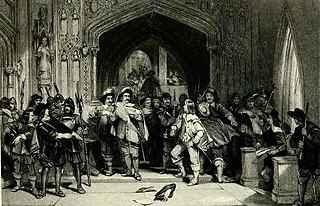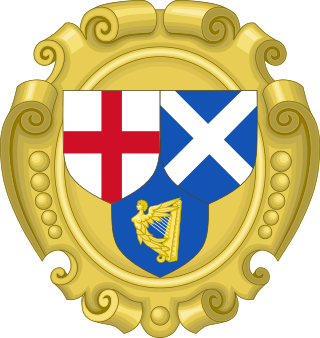Related Research Articles

The Long Parliament was an English Parliament which lasted from 1640 until 1660. It followed the fiasco of the Short Parliament, which had convened for only three weeks during the spring of 1640 after an 11-year parliamentary absence. In September 1640, King Charles I issued writs summoning a parliament to convene on 3 November 1640. He intended it to pass financial bills, a step made necessary by the costs of the Bishops' Wars against Scotland. The Long Parliament received its name from the fact that, by Act of Parliament, it stipulated it could be dissolved only with agreement of the members; and those members did not agree to its dissolution until 16 March 1660, after the English Civil War and near the close of the Interregnum.

The Privy Council is a formal body of advisers to the sovereign of the United Kingdom. Its members, known as privy counsellors, are mainly senior politicians who are current or former members of either the House of Commons or the House of Lords.

The Petition of Right, passed on 7 June 1628, is an English constitutional document setting out specific individual protections against the state, reportedly of equal value to Magna Carta and the Bill of Rights 1689. It was part of a wider conflict between Parliament and the Stuart monarchy that led to the 1639 to 1653 Wars of the Three Kingdoms, ultimately resolved in the 1688–89 Glorious Revolution.

Pride's Purge is the name commonly given to an event that took place on 6 December 1648, when soldiers prevented members of Parliament considered hostile to the New Model Army from entering the House of Commons of England.

The Rump Parliament was the English Parliament after Colonel Thomas Pride had commanded his soldiers, on 6 December 1648, to purge the Long Parliament of members against the Grandees' intention to try King Charles I for high treason.

The Indemnity and Oblivion Act 1660 was an Act of the Parliament of England, the long title of which is "An Act of Free and Generall Pardon, Indempnity, and Oblivion". This act was a general pardon for everyone who had committed crimes during the English Civil War and subsequent Commonwealth period, with the exception of certain crimes such as murder, piracy, buggery, rape and witchcraft, and people named in the act such as those involved in the regicide of Charles I. It also said that no action was to be taken against those involved at any later time, and that the Interregnum was to be legally forgotten.

The English Council of State, later also known as the Protector's Privy Council, was first appointed by the Rump Parliament on 14 February 1649 after the execution of King Charles I.

The Oath of Allegiance is a promise to be loyal to the British monarch, and their heirs and successors, sworn by certain public servants in the United Kingdom, and also by newly naturalised subjects in citizenship ceremonies. The current standard wording of the oath of allegiance is set out in the Promissory Oaths Act 1868.
John Phelps was a Clerk and Registrar of the Committee for Plundered Ministers and of the High Court which tried Charles I of England for high treason in 1649.
Since 1997 the United Kingdom government has been engaged in reforming the House of Lords, the upper house of the Parliament of the United Kingdom. The history of reform before 1997, is set out in sections below about reforms of composition and powers carried out in the past and of unsuccessful proposals and attempts at reform in the twentieth century. Proposals include decreasing the number of lords, introducing a system where lords are democratically elected, or abolition of the House of Lords in favour of a unicameral Parliament.
Robert Hammond was an officer in the New Model Army under Oliver Cromwell during the First English Civil War and a politician who sat in the House of Commons in 1654. He is best known for his year-long role in keeping Charles I of England in custody.

An Act of Parliament in the United Kingdom is primary legislation passed by the UK Parliament in Westminster, London.

The Accession Declaration Act 1910 is an Act which was passed by the Parliament of the United Kingdom to alter the declaration that the Sovereign is required to make at their accession to the throne as first required by the Bill of Rights 1689. In it, they solemnly declare themself to be faithful to the Protestant faith. The altered declaration is as follows:
"I [here insert the name of the Sovereign] do solemnly and sincerely in the presence of God profess, testify, and declare that I am a faithful Protestant, and that I will, according to the true intent of the enactments which secure the Protestant succession to the Throne of my Realm, uphold and maintain the said enactments to the best of my powers according to law."
Between 1639 and 1651 English overseas possessions were involved in the Wars of the Three Kingdoms, a series of civil wars and wars that were fought in and between England, Scotland and in Ireland.

The Instrument of Government was the first constitution of the Commonwealth of England, Scotland and Ireland and was also the first codified and written constitution in England. It was drafted by Major-General John Lambert in 1653.

The constitution of the United Kingdom comprises the written and unwritten arrangements that establish the United Kingdom of Great Britain and Northern Ireland as a political body. Unlike in most countries, no official attempt has been made to codify such arrangements into a single document, thus it is known as an uncodified constitution. This enables the constitution to be easily changed as no provisions are formally entrenched.
The Treasons Act 1649 or Act declaring what offences shall be adjudged Treason was passed on 17 July 1649 by the Rump Parliament during the Commonwealth of England. It superseded the Act declaring what offences shall be adjudged Treason passed about two months earlier on 14 May 1649.

Charles I of England left Oxford on 27 April 1646 and travelled by a circuitous route through enemy-held territory to arrive at the Scottish army camp located close to Southwell near Newark-on-Trent on 5 May 1646. He undertook this journey because military Royalism was all but defeated. It was only a matter of days before Oxford would be fully invested and would fall to the English Parliamentarian New Model Army commanded by Lord General Thomas Fairfax. Once fully invested it was unlikely that Charles would be able to leave Oxford without being captured by soldiers of the New Model Army. Charles had been in contact with the various parties that were fielding armies against him seeking a political compromise. In late April he thought that the Scottish Presbyterian party were offering him the most acceptable terms, but to gain their protection and finalise an agreement Charles had to travel to the Scottish army that was besieging the Royalist-held town of Newark. When he had arrived there he was put under close guard in Kelham House.

The Reliquiae Sacrae Carolinae, or The Works of That Great Monarch and Glorious Martyr King Charls the I, is a book that deals with the events leading to the execution of Charles I of England. Originally published in 1650, it is a collective work of the civil and sacred writings on the King. It incorporates the Eikon Basilike as well as speeches and letters by the King during the rise of Oliver Cromwell and the Parliamentarians. It is sometimes referred to as "The King's Works".
References
- ↑ Ronald H. Fritze; William B. Robison, eds. (1996). Historical Dictionary of Stuart England, 1603–1689 . Greenwood. p. 541. ISBN 0313283915 . Retrieved 21 June 2014.
Vote of No Addresses.
- ↑ Vote of No Address, Helicon Publishing, a division of Research Machines plc. Retrieved 14 September 2009
- ↑ David Plant, Vote of No Addresses, The British Civil Wars & Commonwealth website, Retrieved 14 September 2009
- ↑ Samual Rawson Gardiner (1906). The Constitutional Documents of the Puritan Revolution 1625–1660, 3rd ed., Oxford at the Clarendon Press, Oxford University Press, Walton Street, Oxford. Copy on the web site of the Constitution Society. 79. The Vote of No Addresses.